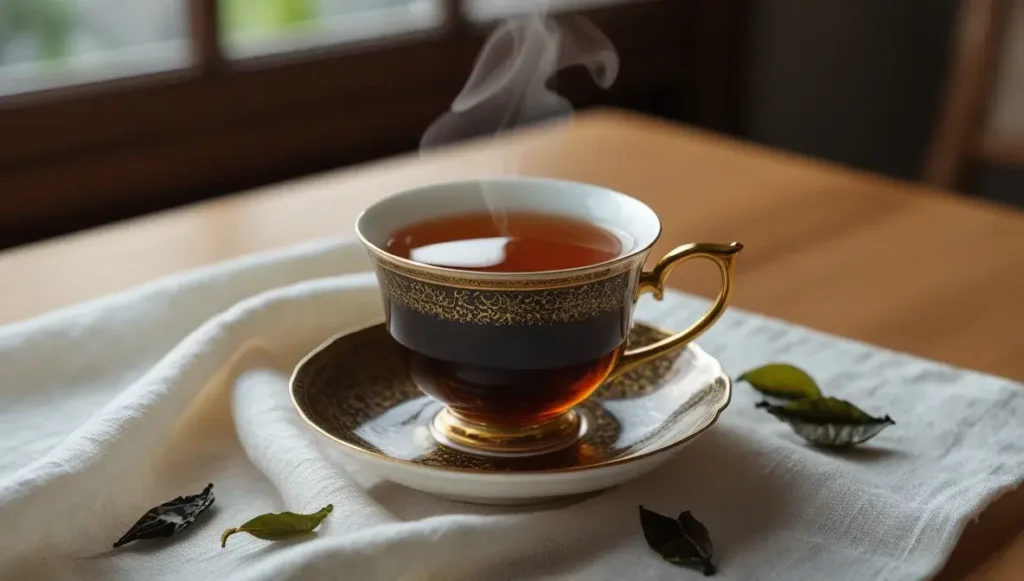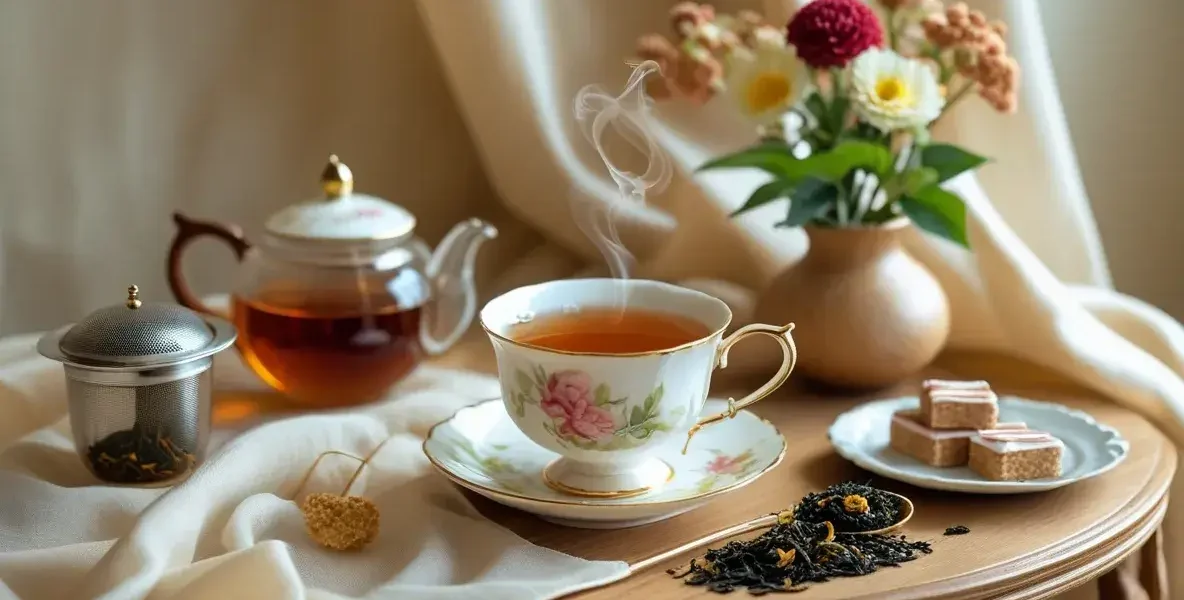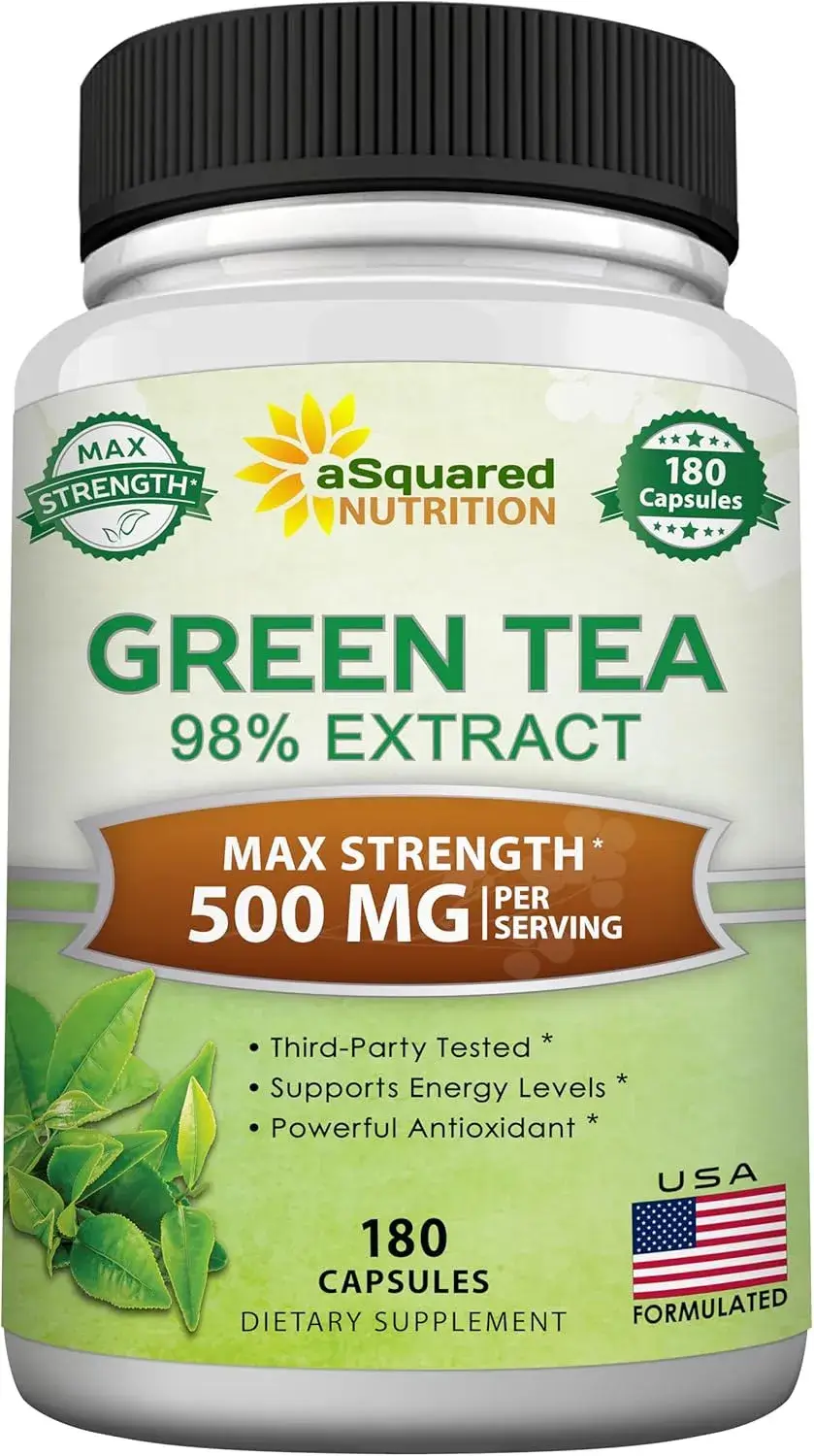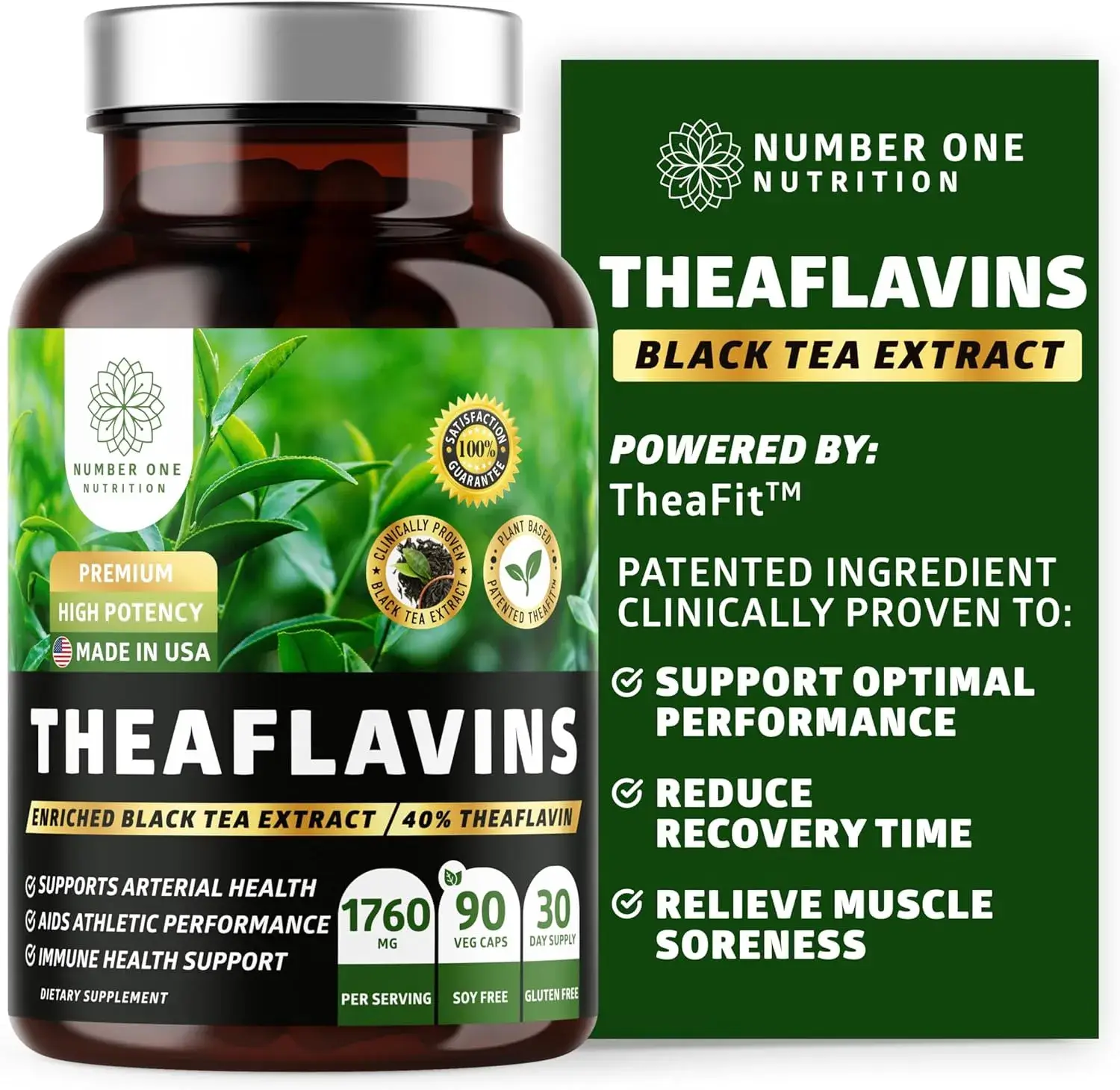Table of Contents
Black tea is good for what? The answer goes far beyond just a morning energy boost. As the most popular type of tea worldwide, that daily cup might be doing more for your health than you realize. In fact, drinking at least two cups of black tea daily can lower your risk of death from any cause by almost 13% compared to non-tea drinkers.
What does black tea do for the body? The health benefits of black tea are backed by impressive research. Studies show it may reduce stroke risk by 16% and support heart health by lowering blood pressure. Additionally, black tea contains compounds that improve blood vessel function and reduce bad cholesterol. We’ll explore these benefits and more, specifically looking at how the unique combination of caffeine and L-theanine in black tea provides a balanced energy lift without the anxiety that sometimes accompanies coffee.
What makes black tea unique?

The unique character of black tea stems primarily from one crucial process that distinguishes it from other tea varieties: complete oxidation. Unlike other teas, black tea undergoes a transformation that fundamentally alters its chemical composition, flavor profile, and health-promoting properties.
How black tea is processed
Black tea processing begins with withering freshly harvested leaves to reduce moisture content from 70-80% to 55-70%. This critical first step allows proteins and carbohydrates to break down into simpler amino acids and sugars while increasing caffeine and polyphenol concentrations.
After withering, the leaves undergo rolling or maceration, which ruptures leaf cell walls and exposes enzymes to oxygen. This initiates the oxidation process that defines black tea. Traditional methods involve rolling leaves by hand, while modern production often uses specialized machinery.
The most distinctive phase – fermentation (more accurately called oxidation) – follows. During this 2-4 hour process, polyphenol oxidase enzymes transform catechins into theaflavins and thearubigins. These compounds give black tea its characteristic reddish-brown color and robust flavor. Finally, heat is applied to halt oxidation and dry the leaves to approximately 3% moisture content.
Difference from green and oolong tea
The fundamental distinction between black, green, and oolong teas lies in their oxidation levels. Green tea undergoes minimal oxidation because leaves are heated shortly after harvest to deactivate enzymes. This preserves its natural green color and vegetal characteristics.
Oolong occupies the middle ground with partial oxidation ranging from 10-80%. Meanwhile, black tea is fully oxidized at nearly 100%. This complete oxidation transforms the leaf color from green to coppery brown and creates a distinctly robust, malty flavor profile compared to green tea’s lighter, grassier taste.
Black tea’s full oxidation also yields higher caffeine content—up to 130mg per 8-ounce serving, approximately half the amount in coffee. Moreover, black tea’s caffeine works alongside L-theanine to promote focus without jitters.
Why oxidation matters
Oxidation fundamentally changes tea’s chemical makeup and health properties. During this process, catechins convert to theaflavins and thearubigins, powerful antioxidants associated with supporting heart health. These compounds contribute to black tea’s dark color, robust taste, and many health benefits.
Furthermore, oxidation transforms flavor compounds. Less oxidized teas maintain fresher, lighter flavors often described as grassy or floral, whereas fully oxidized black tea develops stronger, more robust profiles including malty, fruity, or even spicy notes.
The oxidation process also enhances black tea’s shelf life, allowing it to remain flavorful for several years compared to green tea’s shorter storage potential.
Science-backed health benefits of black tea
Research reveals compelling evidence for numerous black tea health benefits beyond its satisfying taste. The powerful compounds in this fully oxidized brew actively support multiple body systems.
Supports heart health and lowers cholesterol
Clinical studies demonstrate black tea’s positive effects on heart health through its unique polyphenols. Regular consumption significantly reduces LDL “bad” cholesterol—by an impressive 11.1% in one study. Drinking five cups daily lowered total cholesterol by 6.5%, consequently improving overall cardiovascular health.
Furthermore, black tea enhances endothelial function, improving flow-mediated dilation of blood vessels. This effect occurs even at doses as low as one cup per day, making it an accessible addition to heart-healthy routines.
Reduces risk of stroke and cardiovascular events
Perhaps most notable is black tea’s association with stroke prevention. Research tracking nearly 195,000 individuals found that drinking three or more cups daily reduced stroke risk by 21% compared to non-drinkers. Another large study revealed that people consuming two or more cups of black tea per day had 9-13% lower risk of death from any cause.
Indeed, black tea appears particularly effective against ischemic stroke, with a 24% risk reduction observed in comprehensive research. This protection remained consistent regardless of tea temperature or addition of milk or sugar.
Improves blood sugar control after meals
For those concerned about blood sugar management, black tea offers significant benefits. Studies show it reduces postprandial (after-meal) glucose levels in both normal and pre-diabetic adults. One clinical trial found that black tea polyphenols decreased blood glucose area under the curve following sugar consumption, essentially blunting sugar spikes.
May reduce risk of certain cancers
Preliminary evidence suggests black tea may help prevent certain cancers. Research has found associations with reduced risk of gastrointestinal cancers (including oral, gastric, and colorectal). The strongest evidence supports black tea’s protection against oral cancer with a 38% risk reduction. Scientists attribute these effects to tea’s antioxidant properties and anti-inflammatory actions.
👉 Discover the premium black tea that transforms your daily energy 👈
How black tea affects your brain and energy

Your morning cup of black tea delivers more than a pleasant ritual—it provides a unique brain-boosting experience thanks to its distinctive chemical composition.
Caffeine and L-theanine synergy
Black tea contains a powerful duo: caffeine (35-61mg per cup) and L-theanine (4.5-22.5mg per cup). This combination creates effects you won’t find in other beverages. L-theanine facilitates alpha wave generation in your brain, associated with a relaxed yet alert mental state. Interestingly, when paired with caffeine, L-theanine creates synergistic benefits on cognition and mood. This natural partnership explains why tea drinkers often report feeling both energized and calm simultaneously.
Improves focus and alertness
Research demonstrates black tea’s cognitive benefits, primarily through enhanced attention. Studies show black tea significantly improves accuracy on attention tasks and increases self-reported alertness compared to placebo. Even small amounts can speed up cognitive processing—in visual search tasks, black tea drinkers identified target locations faster (925ms vs. 972ms for water drinkers). Additionally, tea improves mental performance throughout the day, mitigating the typical afternoon slump.
Is black tea good for anxiety?
Although black tea doesn’t reduce stress during stressful events, it helps you recover more quickly afterward. One study found that after a stressful task, cortisol levels dropped 47% among black tea drinkers versus only 27% in the placebo group. Black tea also reduced platelet activation and increased subjective relaxation during recovery periods. This explains why many people turn to black tea when feeling overwhelmed.
Does black tea wake you up better than coffee?
Coffee delivers more caffeine per cup (80-100mg versus 40-70mg in black tea), yet black tea provides distinct advantages. The caffeine in tea enters your bloodstream more gradually, creating a gentler, longer-lasting energy boost without the crash often experienced with coffee. This steadier energy flow occurs because compounds in tea bind to caffeine molecules, moderating its release. For those sensitive to caffeine’s jittery effects, black tea often proves more tolerable.
How much black tea should you drink?

Finding the right balance with black tea consumption can maximize its benefits while minimizing potential drawbacks.
Recommended daily intake
For optimal health benefits, experts typically recommend drinking two to four cups of black tea daily. Studies show that consuming two or more cups is associated with lower risk of death from cardiovascular disease and stroke. Nonetheless, it’s important not to exceed 400mg of caffeine daily from all sources. Since an average cup of black tea contains 48-50mg of caffeine, this translates to roughly eight cups maximum.
Best time to drink black tea
Morning consumption offers an ideal energy boost without disrupting sleep patterns. Drinking black tea after breakfast helps hydration, improves focus, and promotes digestion. Accordingly, afternoon tea (especially post-lunch) aids digestion and provides a gentle energy lift. However, those sensitive to caffeine should avoid black tea in the evening as it may interfere with sleep.
Potential side effects of too much caffeine
Excessive black tea intake can trigger anxiety, sleep disturbances, and headaches. Additional concerns include possible interference with iron absorption, especially when consumed with meals. Furthermore, pregnant women should limit intake to no more than 200mg of caffeine daily (about 3-4 cups). People with certain conditions such as anxiety disorders, heart problems, or glaucoma should exercise caution with black tea consumption.
👉 Taste the ultimate black tea experience crafted for true connoisseurs 👈
Final Thoughts: Black Tea Is Good for What in Daily Life?

Black tea clearly offers far more than just a pleasant morning ritual. Throughout this exploration, we’ve seen how this fully oxidized beverage supports multiple body systems simultaneously. After examining the evidence, regular black tea consumption stands out as a simple yet effective way to improve overall health.
Though less caffeinated than coffee, black tea provides a steadier energy boost without the jittery side effects. Additionally, its unique combination of caffeine and L-theanine creates that coveted state of calm alertness many tea drinkers cherish. This explains why millions worldwide turn to black tea when seeking both focus and relaxation.
Beyond the mental benefits, the cardiovascular advantages alone make black tea worth considering. The significant reductions in stroke risk, improved heart function, and cholesterol-lowering effects underscore its value as a daily habit. Likewise, its potential to help manage blood sugar and possibly reduce cancer risk further strengthens the case for making black tea part of your routine.
Finding the right balance matters, though. While two to four cups daily appears optimal for health benefits, exceeding eight cups may introduce unwanted side effects. Overall, black tea represents one of the simplest dietary additions you can make with such wide-ranging health payoffs. That daily cup might be doing more good than you ever realized.
Key Takeaways
Science reveals that your daily black tea habit delivers impressive health benefits beyond just morning energy, making it one of the simplest yet most effective additions to a healthy lifestyle.
• Drinking 2+ cups daily reduces death risk by 13% and stroke risk by 21%, while lowering bad cholesterol by 11%
• Black tea’s caffeine-L-theanine combo provides steady energy without coffee’s jitters, improving focus and mental clarity
• Full oxidation makes black tea unique, creating powerful antioxidants (theaflavins and thearubigins) that support heart health
• Optimal intake is 2-4 cups daily for maximum benefits, best consumed in morning and afternoon to avoid sleep disruption
• Post-meal consumption helps control blood sugar spikes and may reduce risk of certain cancers, particularly oral cancer
The research is clear: that simple daily cup of black tea is working harder for your health than you might have imagined, supporting everything from cardiovascular function to cognitive performance.
👉 Unlock the superior flavor of black tea with proven health power 👈
FAQs
Q1. What are the scientifically proven benefits of black tea? Studies show that regular black tea consumption is associated with reduced risks of heart disease, high blood pressure, stroke, diabetes, and early death. It also supports brain function and may help in managing blood sugar levels.
Q2. How does black tea compare to coffee for energy and focus? While black tea contains less caffeine than coffee, it provides a steadier, longer-lasting energy boost without the jitters. The combination of caffeine and L-theanine in black tea promotes a state of calm alertness, improving focus and mental clarity.
Q3. How much black tea should I drink daily for optimal health benefits? Experts typically recommend consuming 2-4 cups of black tea daily to maximize health benefits. This amount is associated with lower risks of cardiovascular disease and stroke, while staying within safe caffeine intake limits.
Q4. Can drinking black tea help with weight management? While not directly addressed in the article, black tea may support weight management efforts. Its compounds can help improve metabolism and reduce inflammation, potentially aiding in weight control when combined with a balanced diet and exercise.
Q5. Are there any potential side effects of drinking too much black tea? Excessive black tea consumption can lead to side effects such as anxiety, sleep disturbances, and headaches due to its caffeine content. It may also interfere with iron absorption when consumed with meals. Pregnant women and individuals with certain health conditions should limit their intake.





![Why Science Says Morning Tea Benefits Beat Coffee [2025 Research] benefits of tea in the morning](https://www.goteaworld.com/wp-content/uploads/2025/07/benefits-of-tea-in-the-morning-150x150.webp)




![Jasmine Tea vs Green Tea Benefits: Which Gives Better Health Results? [2025] jasmine tea vs green tea benefits](https://www.goteaworld.com/wp-content/uploads/2025/09/jasmine-tea-vs-green-tea-benefits-150x150.webp)


